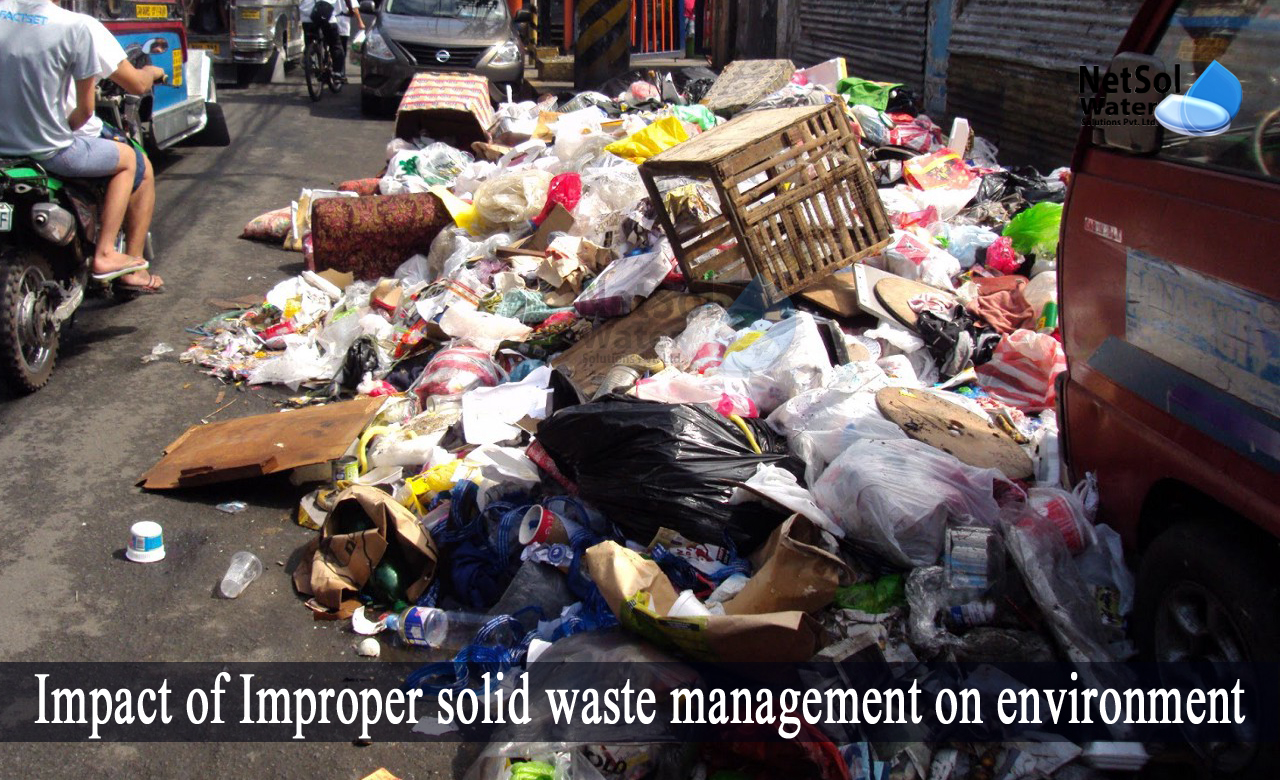Improper solid waste disposal and management practices are one of the biggest, environmental issues that developing countries face.
Solid waste has been a serious environmental concern since the industrial revolution. Aside from garbage generated at school, home, the market, and other public locations, there is also waste generated by industries, farms, hospitals, pharmaceuticals, and other sources.
While, some rubbish, refuse, sludge, and trash are biodegradable, such as paper goods, food droppings, and vegetation such as grass and twigs, others, such as metals, aluminium cans, plastics, damaged computers, and auto components, are not. Because, they do not decompose readily, they accumulate in landfills and trash dumps, causing significant harm to the water, land, and people who live nearby.
What is the Impact of Improper solid waste management on environment?
Inadequate waste management procedures cause health risks, unsightliness, traffic congestion, drainage blockage, and annoyance.
Improved waste management and a more sustainable environment provide prospects for health improvement, revenue production, and vulnerability reduction. Solid waste disposal issues are becoming more complex as population and industrial productivity rise, resulting in increased waste generation. Solid waste management has grown increasingly difficult in recent years, due to high population increase.
Negative environmental consequences of poor solid waste management
Improper solid waste management systems have the following negative environmental consequences:
1: Dispersed solid waste from unlawful open dumping frequently stops drains and sewers, resulting in flooding and unsanitary conditions.
2: The breeding of flies is directly related to open solid waste dumps.
3: Blocked drains and wastewater floods in the city as a result of blocked drains, help mosquitos grow and spread malaria and dengue fever.
4: Rats find an enticing home in the proportion of food waste in open dumps and waste drains.
5: The open burning of collected solid waste causes air pollution.
6: Uncollected solid waste from a few locations pollutes the urban environment, and discourages efforts to keep streets and open areas clean.
7: Discarded polythene bags in collected solid waste are an eyesore, and they may also cause the death of grazing animals that consume them.
8: Heavy solid waste collection vehicles are causing substantial road damage.
9: Local scavengers are not properly cleaning or sterilizing various segregated solid waste commodities, such as plastic bottles and medical supplies.
10: During rainy seasons, generated leachate from open discarded sites pollutes water bodies severely.
Preventive measures to reduce negative effects on humans and the environment
These efforts can be taken to reduce the impact on the environment and humans.
- Waste production should be reduced.
- Encouraging the manufacture of things that generate as little waste as possible after usage.
- Increased material recycling and recovery.
- Increasing the use of plastic recycling.
- Identification labels and codes to help with recycling and sorting plastic containers.
- Municipalities should improve their level of service to the public in terms of waste sorting.
- Encouraging the use of less harmful alternatives to hazardous chemicals, in the manufacturing of goods.
- Waste legislation should be strengthened.
- Collection of hazardous waste at collection stations must be secure, safe, and environmentally sound.
Conclusion
Most poor countries are unable to provide adequate infrastructure for the collection, and disposal of communal solid waste for the entire population. Given the overall harmful consequences of open dumping and open burning, these practices must be vigorously discouraged.
How can we assist?
Netsol Water provides the best solid waste management solutions that are environmentally sustainable. Our converters technology offers numerous advantages that have piqued the interest of many of its users.
To protect our environment, we offer a variety of modern solutions such as solid waste management, wastewater treatment, sewage treatment, and much more. We also advise our clients on ways to prevent solid waste by opting for a sustainable approach, and modern treatment solutions.
For additional information, contact us on +91 9650608473 or send an email to enquiry@netsolwater.com



